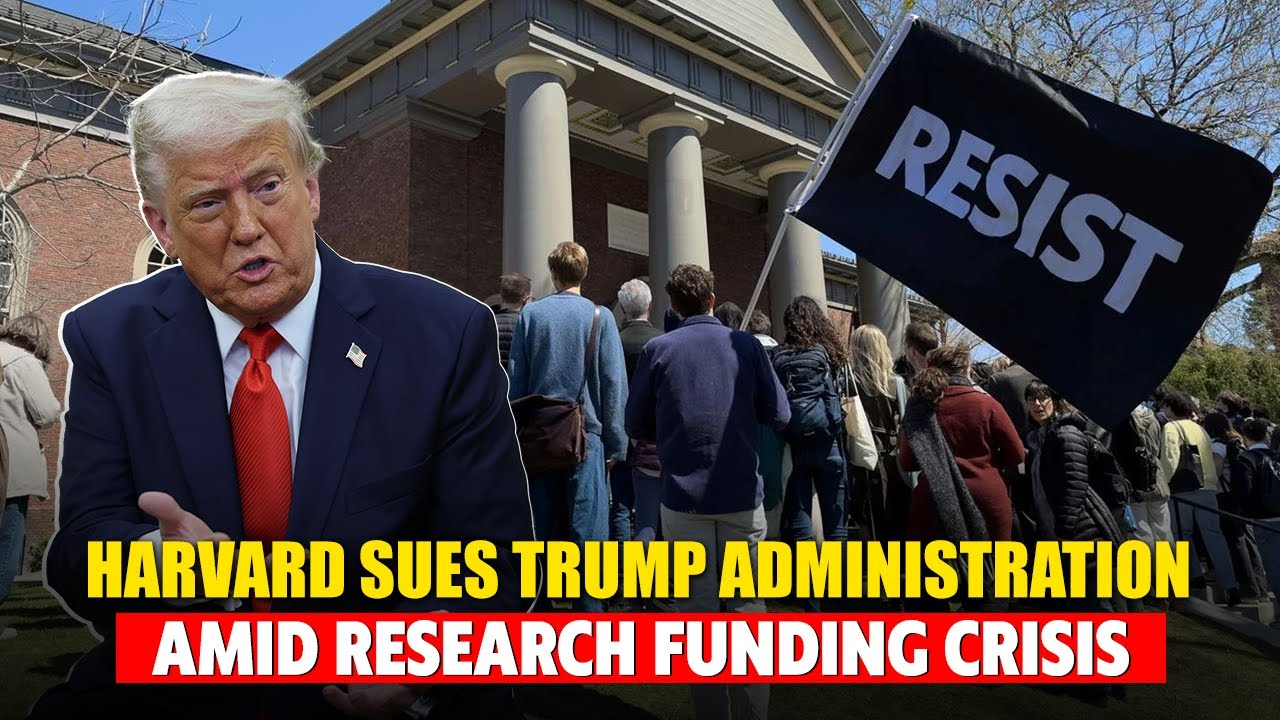The Harvard research funding crisis has sent shockwaves through the academic community, placing vital projects and groundbreaking innovations at a precarious crossroads. Following the Trump administration’s abrupt freeze on approximately $2.2 billion earmarked for Harvard research, prominent faculty members, including Don Ingber from the Wyss Institute, have found their work halted, particularly in the realm of organ-on-a-chip technology. This funding suspension stems from failed negotiations regarding governance changes and audits demanded by the administration, escalating tensions that have led to lawsuits and uncertainty regarding future projects. The implications of this crisis extend far beyond Harvard, endangering the broader landscape of academic research that has long been the backbone of American innovation. As scholars grapple with the immediate fallout, the long-term impact on scientific advancement and US government funding remains to be seen, raising urgent questions about the future of research endeavors across the country.
The turmoil surrounding funding for academic inquiry at Harvard University reflects a broader trend of instability in research finance that threatens to jeopardize pioneering work across various fields. Dubbed a funding crisis, this alarming situation has arisen after the federal government’s decision to withdraw billions in support, which has particularly affected projects related to cutting-edge organ-on-a-chip technologies. As academic leaders like Don Ingber negotiate the fallout, it becomes increasingly clear that the intersection of government funding and scholarly research has reached a critical juncture. With ongoing lawsuits implicating the administration’s demands for oversight and control, the implications for researchers, their projects, and the future of scientific discovery are profound. As these challenges unfold, the academic landscape is left pondering both the immediate repercussions and the long-term viability of innovation in the United States.
The Impacts of the Harvard Research Funding Crisis
The recent crisis surrounding Harvard’s research funding has sent shockwaves through the academic community, directly affecting projects that leverage cutting-edge technologies like organ-on-a-chip. Following the abrupt halt on funding from the U.S. government, a substantial amount—approximately $2.2 billion—was frozen, disrupting not just the operations at Harvard but also the broader landscape of academic research. As projects grind to a halt, researchers are faced with the daunting task of navigating through uncertainty and potential job losses. This crisis highlights the ever-present tension between academic freedom and government oversight.
Don Ingber, the leading figure at the Wyss Institute, has voiced significant concern regarding the repercussions of these government actions. With ongoing lawsuits looming, he emphasizes the fundamental role that academic research plays in fostering innovation in the U.S. economy. Ingber’s initiatives utilize organ-on-a-chip technology to develop solutions for pressing issues, from studying radiation effects to advancing space exploration. The current funding crisis poses a tangible threat not only to his research projects but also to the innovation that fosters technological progress.
Navigating Government and Academia Dynamics
The relationship between government funding and academic institutions has always been intricate but has now reached a tipping point with institutions like Harvard grappling with regulatory demands. The situation underscores the need for a balanced dialogue that fosters collaboration rather than strict oversight. Harvard’s response to the Trump administration’s demands—leading to rejection and subsequent funding freezes—raises questions about the future of funding for essential research areas, including organ-on-a-chip technologies. Engaging in constructive discussions about priorities could pave the way for a more fruitful partnership.
As highlighted by Don Ingber, the essence of American innovation lies within its collaborative efforts between government entities and academia. By properly funding research initiatives, the government can ensure that projects such as those utilizing organ-on-a-chip technologies will yield significant societal benefits. Whether it involves improving healthcare or preparing for future challenges in space exploration, the implications are vast. Ensuring that these partnerships thrive is crucial for nurturing the next wave of technological advancements that society desperately relies on.
The Role of Organ-on-a-Chip Technology in Innovation
Organ-on-a-chip technology represents a frontier in biomedical research, allowing scientists to create miniature human organ systems for testing drugs and understanding diseases. Don Ingber’s projects at the Wyss Institute leverage this technology to assess the effects of radiation on human tissues. As Harvard navigates its research funding crisis, the loss of support risks halting advancements in these vital fields. The capability to simulate human organs dramatically enhances the efficiency and ethical responsibility of biomedical research, offering a glimpse into the potential of future innovations.
Moreover, the application of organ-on-a-chip technology is critical beyond mere laboratory settings. In the context of impending challenges like nuclear accidents or radiation therapies, having the ability to conduct thorough and reliable studies through this technology can save lives. However, the ongoing funding crisis casts a shadow over the future research agenda, making it imperative for universities and government bodies to reassess their collaboration strategies to protect such pioneering technologies.
Consequences of the Funding Freeze on Academic Careers
The implications of Harvard’s research funding crisis extend beyond halted projects to significantly impact the careers of emerging scientists. Dr. Ingber has noted a growing apprehension among his team members, particularly those who are foreign-born or recent arrivals in the United States. The instability surrounding funding and the political climate create uncertainty, leading talented individuals to seek opportunities elsewhere. This could result in a brain drain where the U.S. loses some of its best scientific minds to countries with more stable research environments.
Furthermore, decisions made during this time of crisis carry long-term ramifications for the future of academic research directions at institutions like Harvard. Early-career researchers, in particular, find themselves at a crossroads, with fear influencing their professional trajectories. The disruption of critical research opportunities could deter future generations from pursuing careers in science, undermining the very foundation of innovation in America. Ensuring a supportive environment that nurtures talent is essential for cultivating the research ecosystem.
Organ-on-a-Chip: A Transformative Shift in Biomedical Research
Organ-on-a-chip technology signifies a transformative approach in biomedical research, moving away from traditional methods of testing drugs that often fail in clinical scenarios. By mimicking human organ environments, these chips allow researchers to study complex biological phenomena accurately. Don Ingber’s work pioneers this field, particularly in addressing issues like the effects of microgravity on human health during long space missions. However, with the ongoing funding freeze, the advancement of such innovative solutions is put at risk.
This technology not only could revolutionize the drug development process but also enable researchers to gather insights that were previously unattainable in laboratory settings. The potential applications stretch from healthcare improvements to contributing knowledge essential for future space exploration. As Ingber’s projects show promise, the urgency now lies in securing the necessary funds to maintain momentum and innovation in this vital area, particularly amidst the ongoing governmental funding crises.
Legal Challenges Facing Harvard’s Research Initiatives
The lawsuits initiated by Harvard against the federal government in response to the funding crisis exemplify the legal complexities entwined with academic research financing. Harvard argues that the demands placed by the Trump administration represent an unconstitutional overreach that could stifle academic freedom and innovation. By challenging these actions, Harvard seeks to protect its researchers and projects, especially those utilizing advanced technologies like organ-on-a-chip. The outcome of these legal battles will likely set a precedent for how academic institutions interact with government agencies in the future.
Moreover, the legal fight underlines the inherent tension in academia where external pressures can influence research directions and outputs. As universities like Harvard navigate these waters, it is vital to assess not only their immediate responses to funding crises but also the long-term implications for academic autonomy and innovation. Indications of legal overreach can discourage future collaborations, which are essential for global scientific advancements. Addressing these challenges head-on is pivotal in preserving the integrity of the American research ecosystem.
Future of Space Research Amidst Funding Uncertainty
The recent funding crisis poses considerable challenges for ongoing and future space research projects, particularly those relying on advanced technologies such as organ-on-a-chip. Don Ingber’s second project involving the use of these chips aims to understand the effects of radiation exposure on astronauts. Without adequate funding, critical advancements in research that could enhance astronaut safety during long missions, like those to Mars, could fall by the wayside. As NASA continues to push the boundaries of scientific exploration, the need for reliable research becomes more pronounced.
The tenuous funding situation exemplifies the need for sustained investment in space research driven by governmental and academic synergy. Ingber highlights that understanding radiation impacts will be paramount as space missions become more ambitious. If funding is not restored or ensured, the future of critical research initiatives rests in jeopardy. Developing technologies that support human health in space must remain a priority, as they not only contribute to our understanding of spaceflight but also enhance terrestrial healthcare solutions.
Impact of Political Decisions on Academic Research
Political decisions can have far-reaching effects on academic research, as seen in Harvard’s current funding crisis. By freezing research grants, the Trump administration’s actions disrupt long-standing partnerships that have historically driven innovation. Don Ingber’s experience exemplifies how political moves can adversely affect academic institutions, research priorities, and the well-being of international researchers. The precarious situation reflects a broader theme: the delicate balance between policy and progress.
Furthermore, the uncertainty generated by political decisions can deter global talent from pursuing careers in U.S. academia. The concerns raised by foreign researchers demonstrate the need for a stable and welcoming environment for all scholars. As funding cuts threaten the very fabric of research innovation, it’s essential for policymakers to recognize the significant role that academic institutions play in driving economic growth and health advancements. A collaborative approach is necessary to restore confidence in the system.
Strategies for Securing Future Research Funding
As the Harvard research funding crisis reveals the vulnerabilities within academic funding structures, it’s vital for institutions to develop strategies that can ensure long-term sustainability. Engaging in more proactive dialogues with government agencies, seeking alternative funding sources, and fostering public-private partnerships are pivotal steps that can help stabilize the research funding landscape. Don Ingber’s insights call for universities to advocate for broader governmental support for research initiatives, especially those that are crucial to public health and safety.
Moreover, institutions must leverage their innovative technologies, such as the organ-on-a-chip, to showcase their societal impact and potential returns on investment to appeal to diverse funding bodies. Strengthening relationships with industry stakeholders could also facilitate access to necessary financial backing while promoting research initiatives that address pressing societal challenges. Adopting a multifaceted approach that prioritizes collaboration and transparency will be essential in securing the future of academic research.
Frequently Asked Questions
What is the current state of the Harvard research funding crisis?
The Harvard research funding crisis emerged when the U.S. government issued a stop-work order affecting over $2.2 billion in research funding, including vital projects at the Wyss Institute led by Don Ingber. This crisis has led to halting significant research efforts, including organ-on-a-chip technology projects aimed at modeling human organ responses to various stresses.
How has the funding crisis impacted organ-on-a-chip technology research at Harvard?
The funding crisis has severely impacted organ-on-a-chip technology research at Harvard, particularly projects led by Don Ingber at the Wyss Institute. These projects, funded by contracts worth over $19 million from the U.S. Department of Health and Human Services, have been paused due to the stop-work order, putting critical research on radiation damage and spaceflight effects at risk.
What steps is Harvard taking to address the research funding crisis?
In response to the research funding crisis, Harvard has filed a lawsuit against the government, describing the funding freeze as an illegal overreach. This legal challenge aims to restore the funding for important academic research, including projects essential to the advancement of organ-on-a-chip technology relevant to health and space exploration.
What are the implications of the Harvard lawsuits related to the funding crisis?
The Harvard lawsuits are crucial during the funding crisis as they seek to challenge the legality of the federal government’s funding freeze, which is affecting numerous critical research projects. This legal action could potentially restore financial support for groundbreaking academic research and safeguard projects like those using organ-on-a-chip technology.
What does the Harvard research funding crisis mean for future academic research?
The Harvard research funding crisis may signal a troubling trend for future academic research in the U.S., particularly as it highlights the precarious relationship between academic institutions and government funding. The disruption undermines the partnership that has historically driven innovation, potentially deterring talented researchers from pursuing opportunities in American academia.
How are researchers at Harvard coping with the funding crisis?
Researchers at Harvard, including Don Ingber, are coping with the funding crisis by reallocating resources where possible to keep their teams intact. Strategies include transferring staff to other funded projects, securing internal funding, and maintaining open communication regarding the uncertain future of their research amid ongoing legal battles.
What role does US government funding play in Harvard’s research initiatives?
US government funding plays a critical role in supporting Harvard’s research initiatives, providing essential financial resources for projects that drive scientific advancements. The recent funding freeze represents a significant threat to ongoing research, particularly those reliant on federal contracts for innovative projects such as organ-on-a-chip technology.
What are the broader impacts of the Harvard research funding crisis on the scientific community?
The Harvard research funding crisis has broader implications for the scientific community, as it exacerbates concerns about funding stability and the ability of researchers to conduct vital studies. The potential brain drain of talent and decrease in collaborative innovation can hinder advancements in science and technology, affecting the overall health of the research ecosystem.
| Key Point | Description |
|---|---|
| Stop-Work Order | Harvard received a stop-work order from the Trump administration, affecting various research projects. |
| Impact on Research | The order immediately halted over $19 million worth of research contracts at the Wyss Institute, leading to uncertainty for researchers. |
| Legal Actions | Harvard filed a lawsuit against the federal government challenging the legality of the funding freeze and the administration’s demands. |
| Intellectual Consequences | Potential loss of research progress, including mid-experiment stoppages that could affect ongoing studies and graduate work. |
| Implications for Innovation | The funding crisis raises concerns about the long-term effect on America’s innovation ecosystem and scientific research partnerships. |
| Talent Drain | Researchers are considering relocating to other countries due to job insecurity and concerns about the U.S. environment for scientists. |
Summary
The Harvard research funding crisis highlights a critical juncture in American scientific advancement. This situation underscores the importance of stable funding and government support for research initiatives, which are vital for innovation and technology development. As talented researchers face uncertainty and potential relocation, the integrity of research partnerships and the future of scientific careers in the U.S. hang in the balance. Protecting America’s intellectual capital is essential to maintaining its position as a leader in the global research landscape.



